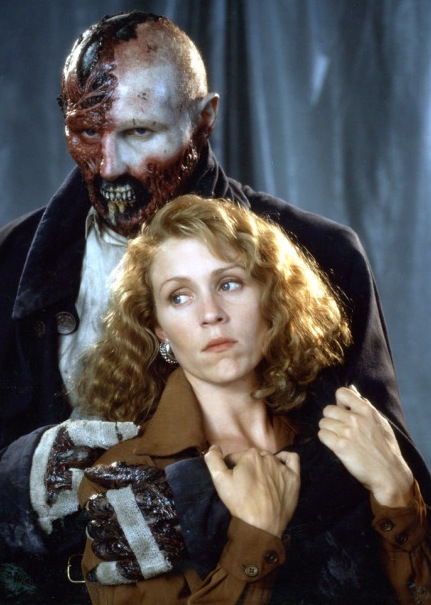Friday, August 24, 1990.
DARKMAN. Co-written by Chuck Pfarrer, Ivan Raimi, Dan Goldin and Joshua Goldin. Music by Danny Elfman. Co-written and directed by Sam Raimi. Running time: 96 minutes. Rated 14 Years Limited Admission with the B.C. Classifier's warning: frequent violence, occasional very coarse language.
DEADMAN GIVES COMIC BOOKS a bad name.
Did I say "Deadman"?
I meant Darkman, of course.
Still, the film is lifeless and, since director Sam Raimi's previous pictures — The Evil Dead (1983) and The Evil Dead II: Dead by Dawn (1987) — both feature the word in their titles, it's a natural mistake.
Darkman is Raimi's cinematic homage to his literary roots. Inspired, perhaps, by the success of Batman, he collaborated with his brother Ivan and several other heavy readers to produce the story of a scientist who survives a laboratory explosion disfigured but in possession of great strength and a need to take revenge upon the criminals responsible for his sorry state.
Their "original" screenplay claims to mix "elements of horror, tragedy, action, romance and wry wit, presented in a sleek visual style reminiscent of a dark comic book sprung to life."
It all makes work for the stunters and sfx-techs, I suppose. Leaps, falls, explosions, computer simulations, holographics, special make-up and matte work (to make the film's No-name City look particularly sinister) all contribute to the health of the Hollywood economy.
Then there is Danny (Batman; Dick Tracy) Elfman, the composer who seems to have cornered the market on comic-book movie scores. After about 20 minutes of his already too-familiar Sturm und Drang, I really wanted to yell "Elfman, will you please shut up! "
That, unfortunately, would leave us listening to nothing but the script committee's dimwitted dialogue.
Badly in need of a remedial reading course, auteur Raimi offers us a sloppy mixture of Swamp Thing and The Shadow, a moribund mess with the dramatic depth of an oil slick.
His hero is Payton Westlake (Liam Neeson, in Jack Palance mode), a biologist working on a synthetic skin formula. "What is destabilizing it?" he moans, demonstrating creative agony.
"Why won't the liquid skin last? Why can't we make these cells stable?"
Beyond his lab, there is serious corruption in No-name City. Westlake's loyal girlfriend, crusading attorney Julie Hastings (Frances McDormand) is getting close to the truth. Too close.
Before either of them can figure it out, the bad guys — a collection of sadistic, unmotivated murderers who make Saddam Hussein seem positively cuddly by comparison — come by and kill Westlake.
Such bad guys richly deserve to be surprised in the night, where they will die in nasty ways, nyah-haa!
And, of course, Westlake is not really dead, just transformed into DARKMAN!
Nyah-haa-hah!
It's witless drivel, and an offence to all thinking comic book fans.
The above is a restored version of a Province review by Michael Walsh originally published in 1990. For additional information on this archived material, please visit my FAQ.
Afterword: Yes, I realize that it's a bit of a stretch to include Darkman in Reeling Back's "Based on Comics" archive. There was no Darkman comic at the time that Sam Raimi wrote it, and the director was still 12 years away from his hugely successful 2002 adaptation of Spider-Man. In 1990, his best-known film was the cult horror classic The Evil Dead (1981). According to published reports, Raimi had wanted to do a Batman feature, but was turned down by the character's copyright owners. Determined to do a comic-book picture, he created his own dark knight to lurk in the urban shadows. A three-issue comic-book adaptation accompanied Darkman's release, and a new, six-issue story followed in 1993. Despite my lack of enthusiasm, the original picture was a financial success for Universal Pictures. Two direct-to-video sequels followed — 1995's Darkman II: The Return of Durant and Darkman III: Die Darkman Die — both credited to the prolific television director Bradford May.
Frances McDormand made her movie debut in 1984's Blood Simple, which also happened to be the first feature film produced and directed by the Coen brothers. McDormand married the older brother, Joel Coen, that same year. In 1985, the Coens collaborated with Sam Raimi, writing the screenplay for director Raimi's second feature, Crimewave, a mixed genre misfire that featured McDormand in a bit part. She then had a role in the Coen's second feature, Raising Arizona (1987), and earned her first Academy Award supporting actress nomination for playing a Southern wife in director Alan Parker's 1988 civil rights drama, Mississippi Burning. She had the starring role in the Coen's sixth feature, Fargo (1996), a performance that won her a best actress Oscar and more than a dozen other acting awards. An outspoken advocate for pay equity in Hollywood, she generated headlines in late May 2015 for telling a Cannes Film Festival audience that she is paid "a tenth of what most males my age, with my experience and my reputation as a film actor make. [Women have] never been paid commensurately, and that has to change.” McDormand, who celebrates her 58th birthday today, continues working to bring about that change.
